Related Research Articles
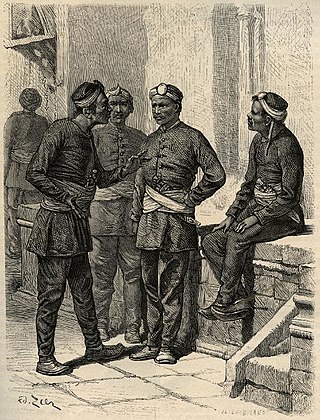
The Gurkhas or Gorkhas, with the endonym Gorkhali, are soldiers native to the Indian subcontinent, chiefly residing within Nepal and some parts of Northeast India.
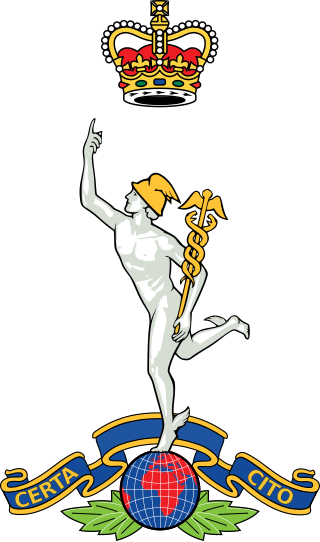
The Royal Corps of Signals is one of the combat support arms of the British Army. Signals units are among the first into action, providing the battlefield communications and information systems essential to all operations. Royal Signals units provide the full telecommunications infrastructure for the Army wherever they operate in the world. The Corps has its own engineers, logistics experts and systems operators to run radio and area networks in the field. It is responsible for installing, maintaining and operating all types of telecommunications equipment and information systems, providing command support to commanders and their headquarters, and conducting electronic warfare against enemy communications.
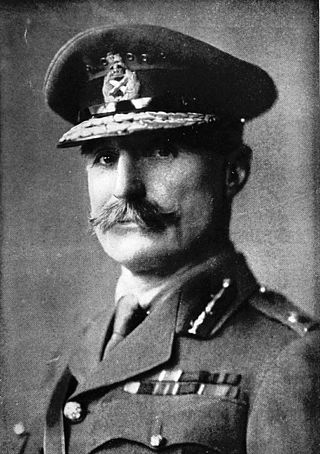
Lieutenant General Sir Aylmer Gould Hunter-Weston, was a British Army officer who served in the First World War at Gallipoli in 1915 and in the very early stages of the Somme Offensive in 1916. He was also a Scottish Unionist MP.
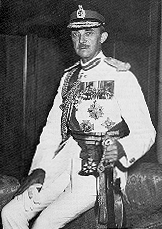
Field Marshal Sir Gerald Walter Robert Templer, was a senior British Army officer. He fought in both the world wars and took part in the crushing of the Arab Revolt in Palestine. As Chief of the Imperial General Staff, the professional head of the British Army between 1955 and 1958, Templer was Prime Minister Anthony Eden's chief military adviser during the Suez Crisis. He is also credited as a founder of the United Kingdom's National Army Museum.

Lieutenant General Walter David Alexander Lentaigne,, also known as Joe Lentaigne, was a senior officer in the British Indian Army.
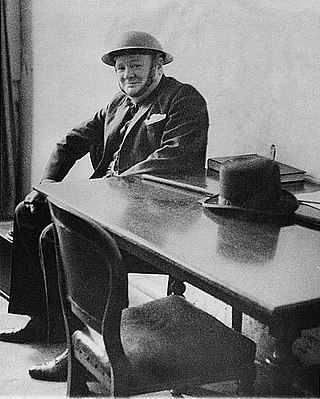
The phrase "blood, toil, tears and sweat" became famous in a speech given by Winston Churchill to the House of Commons of the Parliament of the United Kingdom on 13 May 1940. The speech is sometimes known by that name.

"We shall fight on the beaches" is a common title given to a speech delivered by the British Prime Minister Winston Churchill to the House of Commons of the Parliament of the United Kingdom on 4 June 1940. This was the second of three major speeches given around the period of the Battle of France; the others are the "Blood, toil, tears and sweat" speech of 13 May 1940, and the "This was their finest hour" speech of 18 June 1940. Events developed dramatically over the five-week period, and although broadly similar in themes, each speech addressed a different military and diplomatic context.

"Lions led by donkeys" is a phrase used to imply a capable group of individuals are incompetently led. Coined in classical antiquity, the phrase was commonly used after World War I to describe senior commanders of militaries which participated in the war, most prominently those of the British Armed Forces. The historiography of the United Kingdom during the 20th century frequently described the infantry of the British Army as brave soldiers (lions) being sent to their deaths by incompetent and indifferent commanders (donkeys).
The 6th Queen Elizabeth's Own Gurkha Rifles was a rifle regiment of the British Indian Army, before being transferred to the British Army following India's independence. Originally raised in 1817 as part of the army of the British East India Company, the regiment has been known by a number of names throughout its history. Initially the unit did not recruit from the Gurkhas, although after being transferred to the British Indian Army following the Indian Rebellion of 1857, it became a purely Gurkha regiment, in due course with its regimental headquarters at Abbottabad in the North West Frontier Province of British India. After 1947 the regiment was one of only four Gurkha regiments to be transferred to the British Army and this continued up until 1994, when it was amalgamated with other Gurkha regiments to form the Royal Gurkha Rifles. Over the course of its 177-year history, the regiment was awarded 25 battle honours, although prior to World War I it had only been awarded one and no battle honours were awarded to it after World War II.

Major General Sir William Bernard Hickie, was an Irish-born senior British Army officer and an Irish nationalist politician.
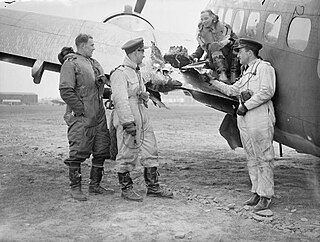
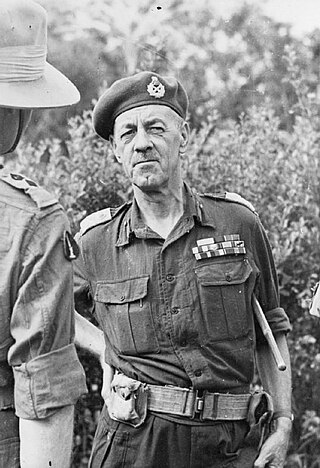
General Sir Geoffry Allen Percival Scoones, was a senior officer in the Indian Army during the Second World War.

The Shot at Dawn Memorial is a monument at the National Memorial Arboretum near Alrewas, in Staffordshire, UK. It commemorates the 306 British Army and Commonwealth soldiers executed after courts-martial for desertion and other capital offences during World War I.
Piers Brendon is a British historian and writer, known for historical and biographical works.
Gary D. Sheffield is an English academic and military historian. He publishes on the conduct of British Army operations in World War I, and contributes to print and broadcast media on the subject.

Major General David Tennant Cowan,, also known as "Punch" Cowan, was an officer in the British Army and British Indian Army during the First and Second World Wars. He led the 17th Indian Infantry Division during almost the entire Burma campaign.

General Sir Cameron Deane Shute,, was a senior British Army officer during the First World War.

The Defence of Festubert was an engagement on the Western Front early in the First World War when Indian and British battalions of the 7th (Meerut) Division of the Indian Army defended the village of Festubert against a German attack from 23 to 24 November 1914. It was one of the first actions in the war in which an attack was made against a prepared defensive position. The British and Indian regiments that took part were awarded the battle honour Festubert 1914.
Lt. Col. John P. Cross OBE is a former British Army officer and now a Nepalese author who currently lives in Nepal. He was educated at Shrewsbury and served in the Brigade of Gurkhas in the British Indian Army and the British Army from 1943 to 1982, most of that time in Asia. His first active service was in the Burma Campaign of World War II, against the Japanese. After the Second World War he became heavily involved in counter-insurgency during the Malayan Emergency and the Borneo Confrontation, and later training and recruiting. He is fluent in Nepali.
References
- 1 2 "Members of the Centre". University of Birmingham. 2009. Retrieved 23 February 2009.
- ↑ "Supplement to the London Gazette, 30 December 1995" (PDF). Archived from the original (PDF) on 16 June 2012. Retrieved 5 July 2010.
- ↑ "Staff - School of History - University of Kent". Archived from the original on 3 February 2015. Retrieved 13 November 2011.
- ↑ The Independent - Books Mud, Blood and Poppycock, by Gordon Corrigan Saturday, 2 August 2003 [ dead link ]
- ↑ The Independent - Books - Piers Brendon A debunker debriefed Friday, 12 May 2006